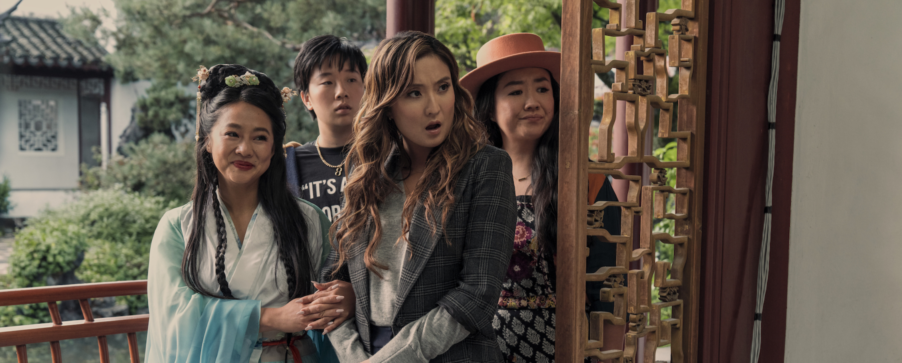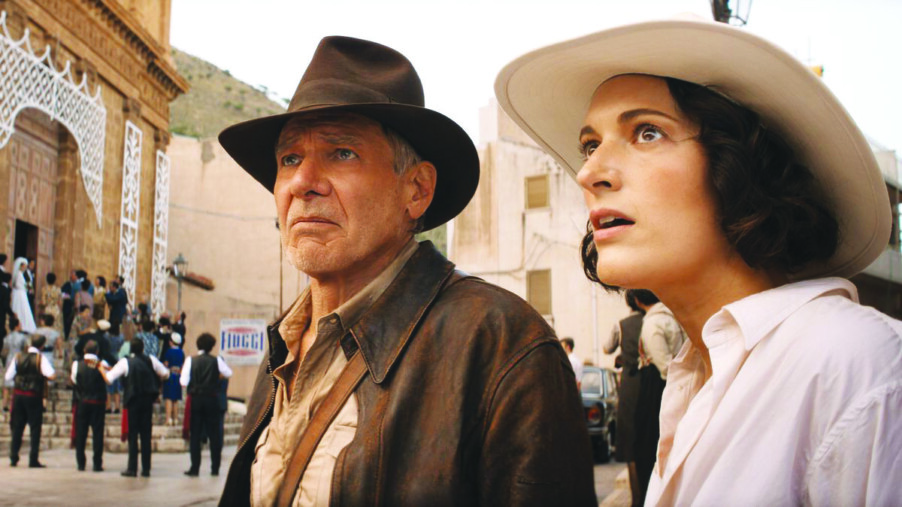Four 20-somethings road trip through China in the soft-hearted comedy Joy Ride.
Attorney Audrey (Ashley Park) and artist Lolo (Sherry Cola) have been best friends ever since Audrey’s adoptive parents (Annie Mumolo, David Denman) excitedly approached Lolo’s parents (Debbie Fan, Kenneth Liu) to ask if the girls — the only two Asian girls in their hometown of White Hills — could play together. Thus began a best friendship that lasted through elementary and high school and well after college.
Audrey is up for a big promotion at work, one that hinges on her closing a deal with a Chinese company. She speaks conversational Mandarin, she tells her boss (Timothy Simons) — but really this woman raised by American parents doesn’t speak Chinese. Though Lolo’s genitalia-based art isn’t the image Audrey wants to project professionally, she asks Lolo, a truly fluent Chinese speaker, to join her when she travels to China to act as a translator for Audrey’s meetings. Lolo’s cousin Deadeye (Sabrina Wu), an awkward K-pop megafan, unexpectedly tags along. In China, Kat (Stephanie Hsu), Audrey’s college roommate who has become a big star of Chinese TV, also joins the group.
The foursome spends a night drinking with Chao (Ronny Chieng), the man Audrey is trying to close a deal with. He wants to know more about Audrey and her ties to China. Lolo lies and says Audrey is close with her Chinese birth mom. This leads the gang on a frantic quest to find Audrey’s birth mother, which sends them to a more rural region of China and through a series of unexpected detours due in part to an American drug dealer and a Chinese basketball team stacked with hotties.
For a movie with some impressively explicit sex scenes, Joy Ride is cute and huggable in its whole friendship vibe. Lolo and Kat have a frenemy relationship as dueling best friends of Audrey, who is wound tight and feels that she doesn’t fit in anywhere (not white like “everybody else” in their American home town but not connected to her Chinese heritage like Lolo and Kat). Deadeye is eager to find friendships IRL, having previously only made good buddies via K-pop fan sites. The various discomforts of the group seem like the discomfort of their relative youth, trying to figure out who they each are and what they want. It’s all ultimately very sweet, and while I did at times feel like some of the jokes could use another pass to make their comedy and their observations sharper, I enjoyed spending time with these characters. Park may be the central character but the excellent Hsu and Cola are the standouts.
Joy Ride isn’t perfect but it is a light and fun bit of friendship, road trip comedy. B
Rated R for strong and crude (and unapologetic! and totally giddy!) sexual content, language throughout, drug content and brief graphic nudity, according to the MPA on filmratings.com (where you can see a crude-but-cute alternate title for this movie). Directed by Adele Lim with a screenplay by Cherry Chevapravatdumrong and Teresa Hsiao, Joy Ride is an hour and 37 minutes long and is distributed in theaters by Lionsgate.
Insidious: The Red Door
(PG-13)
The Lambert family returns in Insidious: The Red Door, the fifth Insidious movie, which picks up on events of the second movie.
The third and fourth movies were both prequels — a fact remembered thanks to Wikipedia because even though I’ve seen and liked all of these movies I forgot basically everything about them other than Rose Byrne and Patrick Wilson. Quick recap: Father and son Lambert both have the ability to astral project into a demon-y realm called The Further, and sometimes demon-y beings try to follow them back.
It’s been a decade since the second movie and the Lambert family isn’t doing great. We first see Josh Lambert (Wilson) at the funeral for his mother. Renai Lambert (Byrne) and the kids — Dalton (Ty Simpkins), Foster (Andrew Astor) and Kali (Juliana Davies) — are with him but leave in a separate car because Renai and Josh have split up. Josh has a difficult relationship with the moody Dalton, who is headed to college. Renai suggests that Josh drive Dalton to school so they can spend time together.
What we know from the movie’s start that the oldest two Lambert dudes don’t is that Josh and Dalton have been hypnotized to forget the previous Insidious movies. So everything about The Further, their journeys to this place and the demons that plagued them there and followed them into the world has been sort of erased. Sort of. They’ve been left with enough shadows of what happened to feel uneasy and foggy.
Once at school, an art teacher’s assignments have Dalton starting to draw and remember the Further. Dalton makes friends with Chris (Sinclair Daniel), a girl mistakenly assigned to room with him for just long enough that she gets dragged into his whole spooky deal. Meanwhile Josh also has flashes of the Further and its denizens. The more father and son remember, the more the demon-y world starts to bleed into our own.
It takes about two-thirds of the movie for the characters to catch up to where we are at the movie’s start. Wilson is engaging as always and there’s some cute stuff between Dalton and Chris as they investigate Dalton’s growing strangeness, but the movie just takes way too long to ramp up. And then it feels a bit like we race to the finish. I wish the movie could have found some way to better balance that mix of when the characters aren’t and then are up to speed, and bring the whole family, including Byrne, who brings such a good exasperated energy, back together faster. C
Rated PG-13 for violence, terror, frightening images, strong language and suggestive references, according to the MPA on filmratings.com. Directed by Patrick Wilson with a screenplay by Scott Teems, Insidious: The Red Door is an hour and 47 minutes long and is distributed in theaters by Screen Gems.
Featured photo: Joy Ride






